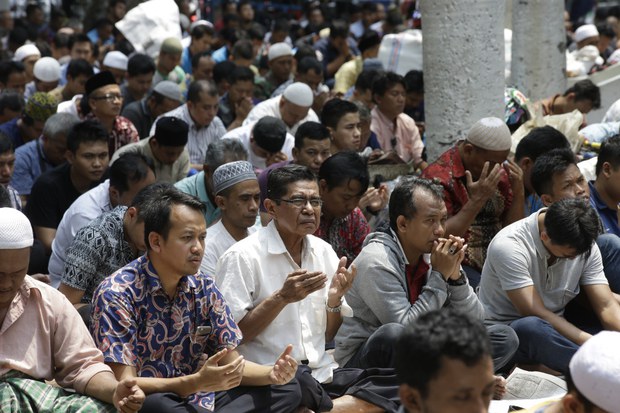Indonesia: Think-Tank Questions Govt’s Anti-Radicalism Efforts
2020.03.03
Jakarta
Two religious study groups in Indonesia’s West Sumatra province produced supporters of the Islamic State militant group who departed to Syria and Afghanistan, according to a new report by a think-tank that questions the effectiveness of the Indonesian government’s anti-radicalism efforts.
The groups, which were established in the cities of Padang and Bukittinggi, expanded their reach through trading and migration networks, direct exposure to radical clerics and movements to new areas, according to the report released by the Jakarta-based Institute for Policy Analysis of Conflict (IPAC).
“The West Sumatra study calls into question the wisdom of the Indonesian government’s approach of treating radicalism as a problem of insufficient nationalism, curable by indoctrination in the state ideology, Pancasila,” IPAC director Sidney Jones said in a statement accompanying the report’s weekend release.
“The problems here were more concrete,” she said, referring to “a mosque that hosted extremist discussions for more than a decade without any attention from local authorities and deportees from Turkey who returned home without sufficient monitoring.”
On Tuesday, a national police spokesman and an official at the National Counter-terrorism Agency (BNPT) declined to comment on the IPAC report, titled “Learning from Extremists in West Sumatra.”
Meanwhile, BNPT had identified several provinces as regions in Indonesia most vulnerable to terrorism.
“West Sumatra is included in the list of 10 provinces prone to terrorism,” Irfan Idris, BNPT director for deradicalization, told BenarNews on Tuesday.
At the end of 2019, BNPT announced that militants were planning to carry out attacks in West Sumatra. Targets included police stations, government offices and places frequented by tourists, it said.
Last July, members of the anti-terrorism police unit Densus 88 arrested a militant suspect named Novendri in Padang for alleged links to the outlawed Jamaah Ansharut Daulah (JAD), a network affiliated with IS.
Similar starts
The 14-page IPAC report said the Padang and Bukittinggi groups were believed to have started as local branches of the Indonesian Mujahidin Council (MMI), a pro-sharia advocacy group established in West Sumatra in 2005.
Their leaders often had divergent views, the report said, pointing out that the Padang group wanted to carry out attacks while the Bukittinggi group was not keen on engaging in violence at home, it said.
By 2013, a member of the Bukittinggi group who had become radicalized wanted to join the Islamic State (IS), but ended up in the northwestern Syrian city of Idlib with the al-Nusra Front (also known as al-Qaeda in Syria).
The report made two points – the first that the Indonesian government made little effort to understand the group’s ongoing ties to the al-Qaeda network.
“The second point is that the Bukittinggi group, for the most part, was not interested in violence. They wanted an Islamic state, they wanted to be part of the caliphate and they wanted to fight Islam’s enemies in Syria. But that does not seem to have translated into a desire to harm anyone in Indonesia,” IPAC said.
Meanwhile in 2017, a member of the Padang group joined IS in Khorasan, an IS “province” in Afghanistan, and called on Indonesians to join him, the report said.
By December 2018, word was out that IS families were encouraged to move to Khorasan to join the fight. One of the most senior Indonesians in Syria, Abu Walid, began making arrangements and sending money to IS fighters to move with their families to Afghanistan, according to the report.
Among other findings, the report concludes that local officials missed several opportunities to work with community leaders to intervene as members of the two groups became attracted to IS and before they left the country.
“In Bukittinggi, the MMI cells-turned-ISIS supporters met at the al-Jihad Mosque from 2006 to 2017 – more than 10 years. In all of that time, surely there was knowledge within local law enforcement of how the discussions there had taken a radical turn,” it said using a different acronym for IS.
The report said local officials could have encouraged clerics and donors to take over mosque development committees, which would give them more say over which groups would be hosted.
Citizens stuck in Syrian camps
For months, government officials have wrestled with the question of what to do with nearly with 700 Indonesians – many of them women and children – who have been confined to camps in the Middle East since IS’s last bastion in Iraq and Syria fell last March.
In August 2019, IPAC urged Indonesia to begin repatriating its most vulnerable citizens who had joined IS and not let them remain in the camps where they could face intimidation from supporters of the extremist group.
“There’s no need to wait for an all-encompassing policy to begin to bring back those most at risk,” Jones told BenarNews at the time.
Last month, the Indonesian government announced it would not repatriate hundreds of citizens who fought for IS in Syria and other countries, but would consider bringing back some of their children on a case-by-case basis.
Security Minister Mahfud MD said the decision had been taken to protect the world’s largest Muslim-majority country from the virus of terrorism.
“An effective rehabilitation, reintegration and monitoring program for deportees, now numbering well over 550, is still lacking in Indonesia,” Jones said in releasing the new report. “Knowing how deportees have fared even several years after their return could help in the development of programs for future returnees.”
The report’s final paragraph states, “much more thought needs to go into the design, implementation and evaluation of these [targeted rehabilitation and reintegration] programs based on a detailed understanding of the backgrounds of the individuals concerned.
“A thorough appraisal of existing government-funded programs is long overdue.”








